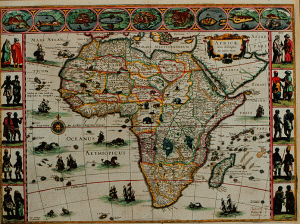
Course Introduction
In this survey of African history course, we will examine a vast place over a manageable span of time: all of Africa from the sixteenth century to the present. Because Africa is the cradle of humankind, it is diverse in language, culture, and history. There is greater human genetic and linguistic variation in Africa, for example, than on any other continent. The same is true for cultural variation, though such diversity among Africa’s populations co-exist with a range of shared spiritual, ideational and material perspectives.
Over the past five centuries, the forces of international enslavement, commerce, colonialism and its legacies, and the exigencies of globalization and the agency of its peoples have shaped Africa. The continent is thus a “modern” place that, like other continents, has over the years received large numbers of immigrants (from east, west, and south Asia, the Arabian Peninsula, Europe, the Americas), many of whom have intermarried with the indigenous population and have complicated the tensions between “tradition” and “modernity.” In short, the movement among humans and forces of change in and outside of Africa, and interactions between them, has help to create the contemporary world we inhabit.
Studying (and teaching) such a vast and diverse continent can be challenging. Because no introductory course can claim to be fully comprehensive, this one will explore several themes in the history of Africa and its peoples that the professor finds important and noteworthy. The readings, lectures, films, and activities will consider broad regions of the continent and the goals of this course include both knowledge and enjoyment. You should come away from this class with a new appreciation for Africa and a general idea of its history from 1500 to the present. Acquiring knowledge about a place few of us know well will require a good bit of effort and concentration on your part. But it is a fun challenge!
In addition to the required texts, we will be reading and supplementing with other resources and videos in our class discussions. Some particularly important works include a novel on the life of a middle class Senegalese woman during the colonial era (So Long a Letter) and about the work and moral dilemmas involving corruption in post-independent Africa (The Beautiful Ones are not yet Born), and Chinua Achebe’s (Things Fall Apart) Things Fall Apart is part tragedy and part documentary. It is the story of Okonkwo and his tragic death after the coming of the white man; it is also a piece of fiction that documents the world that the white man destroyed. We will also be discussing Donald Woods Steve Biko: Cry Freedom about the life and struggles in South Africa, Frantz Fanon’s Wretched of the Earth about the psychological impact of colonialism and where Africa is in the world system, and The African Child (or L’Enfant Noir) or “Dark Child” by Camara Laye where the author depicts an account of his life growing up as a child on an African continent.
The professor will add other recommended readings resources on BB / OpenLab that the students may find interesting for their own future understanding about African’s history. These enjoyable readings in African literature will help you to appreciate some of the culture, politics, economic and logic of African life as well as to experience the continent’s history.
Text: African History from 1500
Video: African History from 1500
Header Image: 6th annual spirit of peace and prosperity conference – World Prayers for Peace and Harmony “A Call to Prayer” banner hosted by the African Views Organization and moderated by Dr. Remi Alapo.
![African History from 1500 – present [AFN 122]](https://africa1500.commons.gc.cuny.edu/wp-content/blogs.dir/17830/files/2021/07/cropped-world-prayers-for-peace-banner-day-1.jpg)


